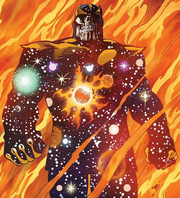- 165,117
- 72,041
So, I just read Jim Starlin's "The Infinity Ending" comicbook via Comixology, which had him take farewell of Thanos, Adam Warlock, and Marvel Comics itself.
Within it, Thanos uses a regulator placed in his universe to absorb The Above All Others, become one with the Marvel multiverse, and almost destroy it and himself completely.
So, should any of this information be noted in The One Above All's or Thanos' profile pages?
Within it, Thanos uses a regulator placed in his universe to absorb The Above All Others, become one with the Marvel multiverse, and almost destroy it and himself completely.
So, should any of this information be noted in The One Above All's or Thanos' profile pages?
